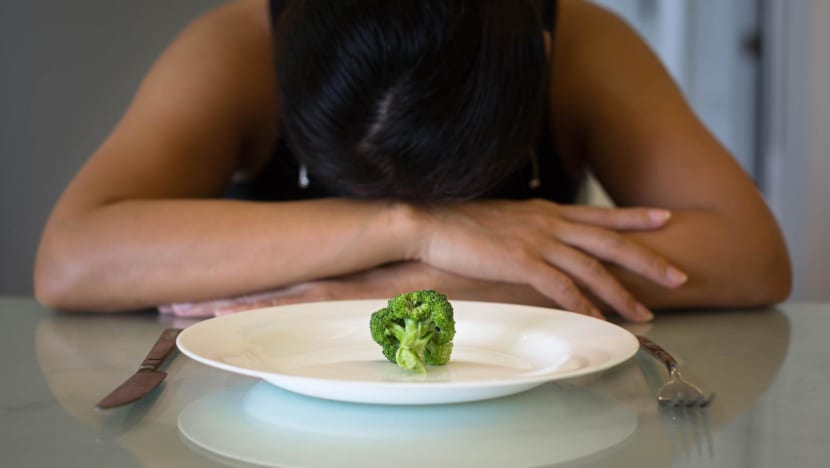I gave my children the freedom I didn’t have. Then my daughter developed an eating disorder
This stay-at-home mother wanted to depart from the traditional, strict upbringing she had. But her daughter’s eating disorder dealt a blow to her confidence as a parent. She tells her story in the podcast series Imperfect by CNA Insider.

There’s no one single contributing cause of an eating disorder. (File photo: iStock/globalmoments)
* Names have been changed.
SINGAPORE: It was the last day of school before the June holidays, and when Ivy* picked her daughter up from school, the latter thought they were off to a family lunch.
Instead, they soon pulled up at KK Women’s and Children’s Hospital (KKH). “I’m sorry,” Ivy told her daughter, Sophie*. “We have to hospitalise you because you’re not getting better.”
It was a last resort for Sophie’s parents, a year after she was diagnosed — at age 16 — with anorexia nervosa, an eating disorder characterised by an intense fear of gaining weight and an unhealthy obsession with exercise.
She had been getting family-based treatment, whereby parents take the lead in supervising their child’s eating until the child reaches a healthier weight. As part of this, Ivy and Sophie had to draw up a contract — with help from a psychologist — for Sophie to hit weight targets for every medical appointment.
Not meeting those targets would mean the loss of privileges like going to school camps, meeting friends and having access to her devices. And as a stay-at-home mother, Ivy was the one enforcing compliance.
“I had to be very strict with her and treat her like a small child,” says Ivy, 58. This made Sophie angry, and mother and daughter ended up shouting at each other.
Despite all this, Sophie did not gain weight. Ivy remembers seeing discarded food in the toilet bowl and catching her lying about eating as well as exercising secretly in her room.
This was why Ivy and her husband eventually had to have Sophie hospitalised in 2019.
“I felt terrible,” recalls Ivy. “I had to do something that I didn’t want to do, … but I believe it was needed, even if she disagrees.”
Ivy tells her story in the fourth episode of the podcast Imperfect by CNA Insider. The limited series delves into the questions every parent will face, with heartfelt stories about dealing with parental dilemmas.
LISTEN: Am I a bad parent … if my child developed an eating disorder?
THE CALL FROM SCHOOL THAT SHOCKED HER
What Ivy had to do was at odds with the kind of parent she initially set out to be.
She describes her upbringing as “traditional and strict”. And as the eldest of three girls, she had to push the boundaries a little, like when she had to make a case for perming her hair or piercing her ears.
So when she had a son and her daughter four years later, she determined to give them more independence than she used to have.
“The world was changing, so we wanted our kids to be more confident socially,” she says. “Over the years, I tried to give them more freedom … in an age-appropriate way.”
As a hands-on, stay-at-home mother, she had a close relationship with them. That was why she got a shock when she received a call from Sophie’s Secondary Four physical education teacher. “Her weight loss is a concern,” Ivy remembers hearing.
Instead of putting on weight as teens her age should be doing, Sophie, who weighed about 48 kilogrammes in the middle of Secondary Three, had started losing weight — about 7 to 8 kg by that time.
“This can’t be,” Ivy remembers thinking. “Her current weight isn’t terribly bad: It’s (bordering on) underweight and the low end of the healthy range.”
Only when she brought Sophie to KKH did she realise that she had been looking at the Body Mass Index guidelines for adults, which do not apply to children.
She had also shrugged off some red flags. For example, about a year before her daughter’s diagnosis, Sophie started becoming more conscious of eating healthily and very interested in exercising.
This realisation dealt a blow to Ivy’s confidence as a parent.
“We made some sacrifices so one parent could stay at home, to have a better family life, yet there are issues like this,” she says. “So there was some feeling of angst and self-doubt.”
But according to KKH’s head of adolescent medicine service, Elaine Chew, while there are things parents can do to reduce the risk of children developing an eating disorder, “parents aren’t to blame for the development of an eating disorder”.
“There’s no one single contributing cause,” she says. The causes can include a genetic predisposition, certain personality traits — such as being a perfectionist — and social media.
So how did Ivy rebuild her relationship with her daughter? And how did this journey make her family stronger?
Find out in Imperfect by CNA Insider. The episode includes insights from Chew on spotting signs of an eating disorder and what parents can do to reduce the risk of their children developing one.
Imperfect by CNA Insider is a podcast on which young mother Lianne Chia talks to other parents grappling with dilemmas that cause them to question whether they are doing things right. New episodes every Saturday, for a limited time.
Non-profit organisation Caregivers Alliance Limited provides support for carers of those with mental health conditions. This includes a training programme for carers of those with eating disorders. Click here for more information.


















